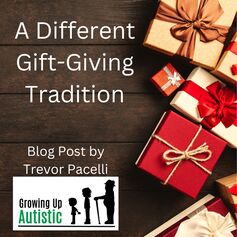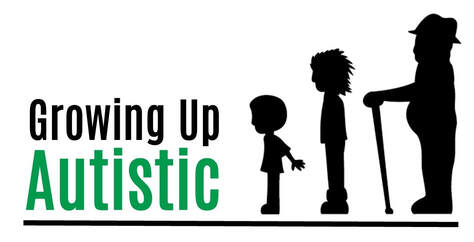 By Trevor Pacelli Gift-giving at Christmas time can be difficult for anyone, but even more so for someone on the autism spectrum such as myself. Throughout my childhood and most of my adulthood, my family gave each other Christmas gifts the same way most everyone else does, by giving each family member a present we picked ourselves. That meant every year, I got one gift from Mom, one from Dad, and one from my sister. In turn I gave a gift to each of them. I also got a gift from my grandparents, and when my sister got married, her husband was included in the gift-giving. This system worked out fine throughout my childhood, as we got the whole routine done in about twenty minutes, and my sister and I just spent the rest of Christmas day playing with our gifts and watching A Christmas Story on TBS. But things changed as we got older. Nowadays, my family and I are all the type of people who already feel content with what we currently own; whenever we want/need something, we just buy it ourselves instead of waiting for someone else to do it for us. So, when it came to putting together Christmas wish lists, thinking of what to put on our lists became more and more stressful for all of us, and having to stick to the lists just took out the personal feeling behind a present. I’ve tried in the past to deviate from the wish lists I’ve received from family members, and that only resulted in hurt feelings. Furthermore, it was a symptom of an even bigger problem of mine, my inability to truly understand others. Because I never had much common sense in assessing the personal interests of others, I never knew exactly what someone would want in a present. To add to the damage, I was expected to just know all these many unspoken rules of gift exchanges, such as following a price limit so that it’s not too expensive or too cheap. The gift-giving exchange was much easier for me as a kid, because I could get excited for whatever toys I’d be getting, and I wasn’t expected to select meaningful gifts for my other family members (or my mom would just help me find the right gifts). But once I became an adult and was suddenly expected to put some actual thought into my gifts, the holiday officially started to feel like work rather than a joy. The rest of my family were feeling similar emotions, so in 2019, we shook things up. Rather than gifts, we gave each other cookies. I made four different sweet treats for each family member: one for Mom, one for Dad, one for my sister, and one for my brother-in-law. I also got cookies from them in exchange. Although I’ll admit my treats didn’t turn out perfectly, we were still satisfied with doing Christmas this way, and we’ve kept this tradition ever since. We have kept a scaled-down version of traditional gift-giving. We put our names on separate pieces of paper, each drawing a name, and that’s who we give a gift to, one that’s between $20-$30. We did this before starting our new cookie tradition, except before the gifts were stored in our stockings. But now we just traditionally wrap these gifts instead of using the stockings. (In fact, stockings have now become so irrelevant to our Christmases that my Mom did not even bother putting them up on the mantlepiece this year.) Since making this switch, we no longer write out Christmas wish lists or feel pressured to give everyone the right gift. And thus, Christmas has become a truly joyful time again. This whole system works better for me personally because it’s easier to learn another’s food tastes than which material objects would work best as gifts for them. Plus, I already love food, so creating unique family cookies is genuinely fun for me. You too can create your own holiday traditions in this way. Perhaps you have a severely autistic child who will never develop past the mentality of a three-year-old, so a suitable Christmas tradition to include them could be exchanging drawings or other works of art instead of traditional presents. That way, the autistic child could apply something they’re capable of doing without having to go through the stress of finding a gift for someone. That’s just one idea that can encourage you to use your imagination as you create new holiday traditions that demonstrate how unique your family is, and more importantly, to ensure nobody is left out on what should be the most joyous day of the year. Trevor is a young adult with autism and the author of several books, including Six-Word Lessons on Growing Up Autistic and What Movies Can Teach Us About Disabilities.
0 Comments
Leave a Reply. |
Inspiration for Life with AutismThis blog has a variety of articles about people living life with autism, and topics and ideas that can help in the journey. Guest bloggers are welcome. Inspired by Trevor, a young adult film critic, photographer and college graduate on the autism spectrum. Categories
All
Archives
July 2024
|
Proudly powered by Weebly

 RSS Feed
RSS Feed